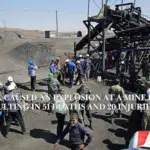Hezbollah launched over 100 rockets into northern Israel early on Sunday, targeting areas near the city of Haifa, which marked a significant escalation in the ongoing conflict between the group and Israel. This barrage was a direct response to Israeli strikes on Lebanon that had resulted in numerous casualties, including the death of a senior Hezbollah commander. The situation has intensified tensions, with both sides appearing to edge closer to an all-out war.
The overnight rocket attack was prompted by Israeli military actions that have reportedly killed dozens of individuals in Lebanon. These strikes were unprecedented in their scale and included attacks on Hezbollah’s communication infrastructure. In Israel, air raid sirens blared across northern regions, sending hundreds of thousands of residents rushing to shelters to protect themselves from incoming fire.
One rocket from the barrage hit close to a residential building in Kiryat Bialik, a city situated near Haifa, injuring at least three people and igniting fires in surrounding buildings and vehicles. This incident illustrates the direct threat posed to civilian life by the ongoing military exchanges. Such developments have raised concerns about the safety of residents in northern Israel, who have been forced to live under the constant threat of rocket fire and military retaliation.
On the Lebanese side, the Health Ministry reported three fatalities and four injuries due to the Israeli airstrikes near the border. The ministry did not clarify whether the casualties were civilians or combatants, which reflects the complexity of the situation on the ground. Civilian areas in Lebanon have often been caught in the crossfire of military operations, raising humanitarian concerns about the impact of the ongoing conflict.
In a statement following the escalation, Hezbollah’s deputy leader, Naim Kassem, declared that the group had entered an “open-ended battle of reckoning” with Israel. Kassem’s remarks signaled Hezbollah’s determination to escalate its military response. He also warned that this situation could lead to increased displacement for residents in northern Israel. “We admit that we are pained. We are human. But as we are pained — you will also be pained,” Kassem said during the funeral of a top Hezbollah commander, Ibrahim Akil. His comments conveyed a sense of resolve among Hezbollah leaders to continue their military efforts against Israel and emphasized the group’s commitment to retaliating for losses suffered.
Kassem further indicated that the rocket attack into Israel was only the beginning, threatening to target the Israeli economy directly. Such rhetoric highlights Hezbollah’s strategy of not just engaging in military conflict but also aiming to undermine Israel’s economic stability. This approach suggests a broader goal of weakening Israel’s ability to sustain a prolonged military engagement.
In response to these developments, Israeli Prime Minister Benjamin Netanyahu stated that Israel would take all necessary actions to restore security in the northern regions and enable residents to return to their homes safely. Netanyahu emphasized the unacceptable nature of the “wanton rocketing” of Israeli cities, reaffirming Israel’s commitment to defending its territory and population. His government is determined to retaliate decisively against threats to national security.
The Israeli military reported conducting extensive strikes across southern Lebanon over the past 24 hours, targeting approximately 400 militant sites, including rocket launchers. Lt. Col. Nadav Shoshani, an Israeli military spokesman, claimed that these operations had prevented an even larger attack from Hezbollah. The scale of the Israeli military response demonstrates the government’s resolve to counteract the threats posed by Hezbollah and to deter further aggression.
As the conflict escalates, the risk of civilian casualties on both sides remains high. The impact of military strikes on civilian infrastructure is a significant concern, as residents in both Lebanon and northern Israel face the dire consequences of ongoing hostilities. This situation raises urgent humanitarian questions regarding the protection of non-combatants in conflict zones.
The dynamics of this conflict are influenced by a complex interplay of regional and international factors. Hezbollah, backed by Iran, has long positioned itself as a resistance group against Israel, drawing support from various segments of Lebanese society. The group’s military capabilities have grown significantly over the years, allowing it to pose a formidable challenge to Israel’s military superiority.
Conversely, Israel’s military strategy relies on its advanced technology and intelligence capabilities to target Hezbollah’s infrastructure while attempting to minimize civilian casualties. However, the reality on the ground often leads to collateral damage, further fueling resentment and anger among affected populations.
Both sides face internal pressures that complicate their military strategies. In Israel, public sentiment demands strong action against perceived threats, while in Lebanon, Hezbollah must balance its military objectives with the need to maintain support among civilians who are weary of war. The civilian toll and destruction caused by military actions can sway public opinion, leading to calls for de-escalation or further retaliation.
As the situation unfolds, the international community watches closely, with various countries expressing concern over the potential for a broader conflict in the region. Diplomatic efforts aimed at achieving a ceasefire or de-escalation have often struggled to gain traction amid ongoing hostilities.
In conclusion, the recent escalation between Hezbollah and Israel has highlighted the fragility of peace in the region and the immediate risks posed to civilians on both sides. With Hezbollah declaring an “open-ended battle of reckoning” and Israel responding with significant military action, the likelihood of further conflict remains high. The situation underscores the urgent need for diplomatic efforts to address the underlying tensions and to seek a sustainable resolution to the long-standing hostilities. Without such efforts, the cycle of violence is likely to continue, with devastating consequences for civilians caught in the crossfire.


